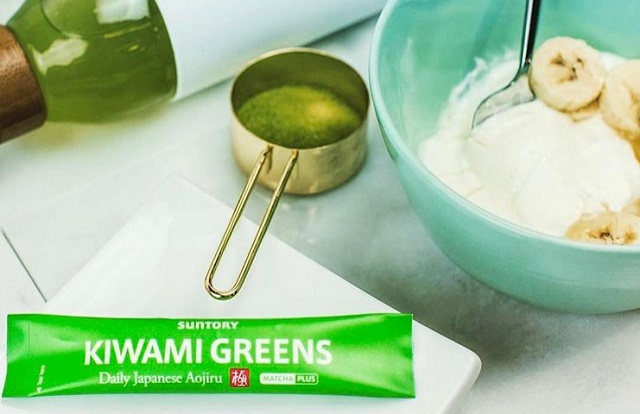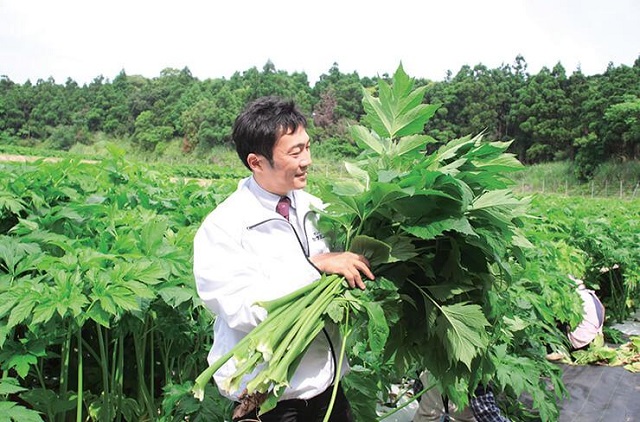This is a post written by Kiwami Greens—an Elephant partner. We’re honored to work with anyone who is this dedicated to mindful eating, providing nutrient-dense options, and finally convincing me to give this green juice thing a try. ~ Ed.
~
The Japanese have the second-highest life expectancy in the world (only Monaco ranks higher).
Many factors influence lifespan, of course, but Japanese longevity can be at least partly traced to diet—one that’s evolved over the centuries to take the best of what nature has to offer, and craft it into delicious food that’s good for the mind, body, and soul.
Vegetables play a much more central role in the Japanese diet than the typical U.S. diet and Japan has a long history of plant-based medicine—using herbs and other flora to create lasting, vibrant change.
Kiwami Greens is one such Japanese vegetable-based drink. Known as Aojiru (/ah-oh-ji-ru/), it has been used to promote health and wellness in Japan for centuries—the first account of it can be found in Japan’s oldest surviving medical text, Ishinpo, which dates from 984. Today, millions of Japanese start their day with a glass of aojiru.
Virtually unknown in the west, Aojiru is a potent blend of vegetable powder packed with the vitamins and minerals found in green leafy vegetables—a food group often lacking in the average American diet, which typically falls well short of even the USDA’s recommendations for vegetable consumption.
One of the four key ingredients is ashitaba, a large, perennial herb that is grown in the nutrient-rich soil of southern Japan and has been highly prized for its healing and restorative qualities for centuries. In Japanese culture, it is said that ashitaba is so full of life that if you pulled it off the bud, it would sprout again tomorrow, which is precisely the origin of it’s name, which translates to “tomorrow’s leaf.”
When combined with the other three ingredients compounded in Aojiru—young barley leaf, sencha (green tea), and matcha (powdered green tea)—this blend is unparalleled in terms of nutrition density.
Give your health a kick with Kiwami Greens >>
What Western Science has to say about this ancient Japanese Remedy
While folklore and traditional Japanese medicine make much of aojiru and ashitaba’s healing and restorative properties, Western medical science only began taking an interest in ashitaba in the 1990s, but what they’ve found so far is exciting.
Existing studies have been relatively small in scale, but suggest the Japanese are right—ashitaba is indeed a superfood capable of improving health when taken in fresh and powdered form.
But fresh ashitaba is almost impossible to find in the U.S., partly because of the huge Japanese demand for the “tomorrow leaf.”
Kiwami Greens is one of the first Japanese vegetable drinks to break into the U.S. market.
Each pack includes a proprietary blend of ashitaba, young barley leaf, sencha (green tea), and matcha (powdered green tea). The blend offers the vitamins and minerals so often missing from the U.S. diet, and supplements your daily recommended portions of vegetables.
Kiwami Greens are also easy and versatile to use. Mix a pack with water, or add the powdered vegetables to your favorite juice or smoothie, or with your oatmeal, almond milk, fruit salad with vegan yoghurt. It basically goes with anything.
Making aojiru part of your morning routine can help you feel energized, healthier, and ready to meet the day.
“I’ve been looking for some new and fun ways to become healthier in the New Year, and this stuff has been a nice addition for me. I’m guilty of buying unhealthy drinks from the vending machine at work when things get crazy, but now I just make my own veggie drink, without the guilt! Sometimes I add it to my lunch too; it works with pretty much everything.” ~ Amy March
Nutritional properties
Ashitaba is remarkable for its diverse collection of vitamins and minerals. When you eat or drink it as a Japanese vegetable drink, your body receives a boost of Vitamin A, Vitamin E, Vitamin K, Vitamin B12, Vitamin B2, Niacin, Vitamin B6, Folate, Pantothenic Acid, Vitamin C, Calcium, Copper, Iron, Magnesium, Manganese, Phosphorus, Potassium, Sodium, and Zinc.
The Vitamin B compounds found in ashitaba help regulate many important body functions, including mood and sleep patterns. Vitamin B helps the body reduce inflammation and aids in recovery after exhaustion. B12 is especially important, with benefits such as:
>> Improving blood cell production
>> Improving concentration
>> Increasing the production of human growth hormones
>> Prompting nerve growth
>> Strengthening the immune system.
Ashitaba also contains significant amounts of Vitamin E, a known antioxidant capable of reducing inflammation and slowing the aging process. The plant is a great source of calcium, and contains more dietary fiber than lettuce. Some studies show ashitaba promotes healthy gut bacteria, and has a positive effect on peptic ulcers and GERD (gastroesophageal reflux disease).
Get your hands on some of this Japanese goodness >>
Ashitaba and the Aging Process
We’ve known for some time that Vitamin E contains antioxidant properties, and is an important factor in fighting free radicals. Free radicals are atoms with odd numbers of electrons that form when oxygen combines with a set of specific molecules. Once they form in the body, free radicals cause a chain reaction within the body’s cells, weakening cell membranes and interfering with DNA’s ability to replicate accurately. Oxidization caused by free radicals are associated with premature aging, inflammation, a weakened immune system, and the onset of self-damaging diseases like cancer.
Ashitaba has a higher total antioxidant capacity (TAC) than green tea, giving it the potential to be a powerful aid in the fight against aging and free radical damage. TAC is determined by a lab test called ORAC, short for oxygen radical absorbance capacity. ORAC exposes a small amount of the food being tested to molecules that trigger free radical activity. The less free radical activity seen in these molecules, the higher the food’s ORAC score.
ORAC scores are handy because the test measures the antioxidant properties of the food as a whole, rather than specific compounds such as Vitamin E. This way, any antioxidizing effects from plant compounds we don’t fully understand can be measured.
By some sources, brewed green tea has an ORAC score of 3.50. Ashitaba score of 6.20 is almost double that.
The Chalcone Effect
Chalcones are “aromatic ketones,” or compounds that are vital for many biological functions. Ashitaba has the distinction of having the highest concentration of chalcones found in the natural world, mostly in the yellow sap of the plant’s stem.
Chalcones have a wide range of biological activities, including:
>> Antioxidative
>> Antibacterial
>> Anthelmintic, antiprotozoal, and amoebicidal (defense against parasites)
>> Antiulcer
>> Antiviral
>> Anticancer.
At the levels present in ashitaba, chalcones can help regulate blood pressure and lower bad cholesterol levels. They may also improve mood and reduce anxiety.
~

Nerve Growth Factor and Ashitaba
Nerve growth factor, or NGF, is a protein that plays an important role in the development and maintenance of the central nervous system’s nerve cell foundations. NGF also maintains a connection between the central nervous system and the peripheral nervous center (the nerves and ganglia outside the brain and spinal cord). Insufficient NGF can lead to neural degeneration, which has been linked to dementia, Parkinson’s disease, and Alzheimer’s.
How it helps is unclear, but studies show ashitaba increases production of NGF, possibly due to the high level of Vitamin B compounds in the plant. This may explain the Japanese belief that regular consumers of ashitaba have improved and longer-lasting memories.
Energy Boosts
Less well-researched are the effect of ashitaba-containing Japanese vegetable drinks like Kiwami Greens on energy. For a glimpse of ashitaba effects in this area we must look to anecdotal evidence. Users of ashitaba often say it causes an energy buzz without the jitteriness associated with coffee—and without the caffeine crash. Despite the energy boost, the overall effect is often described as calming.
What causes this effect? As yet, we don’t know. It may develop out of the synergistic action of Vitamin B compounds with chalcones and other antioxidant properties, but more research is needed to pinpoint the reason for ashitaba’s energizing properties.
Interested in adding ashitaba to your daily health regime?
Try Kiwami Greens for yourself today >>
~
Editor: Khara-Jade Warren





Read 1 comment and reply